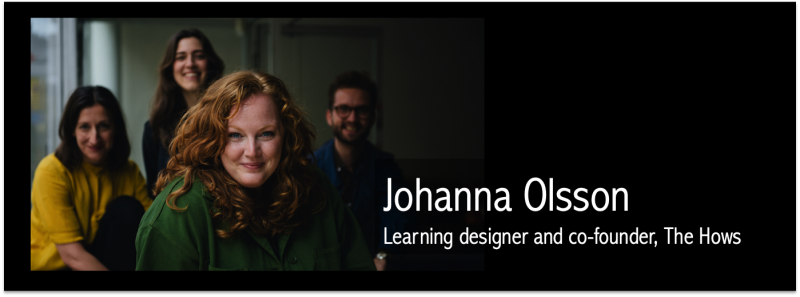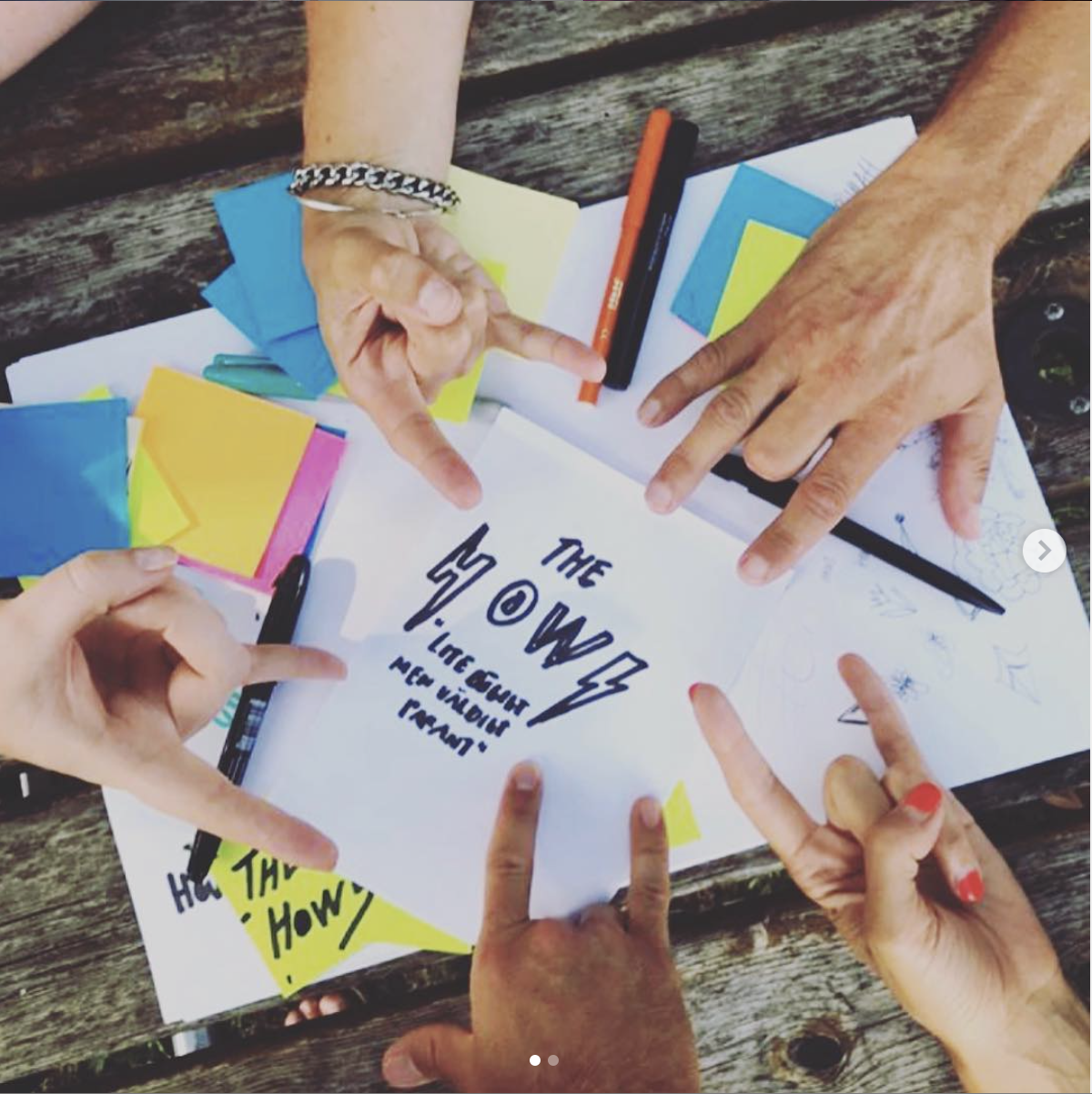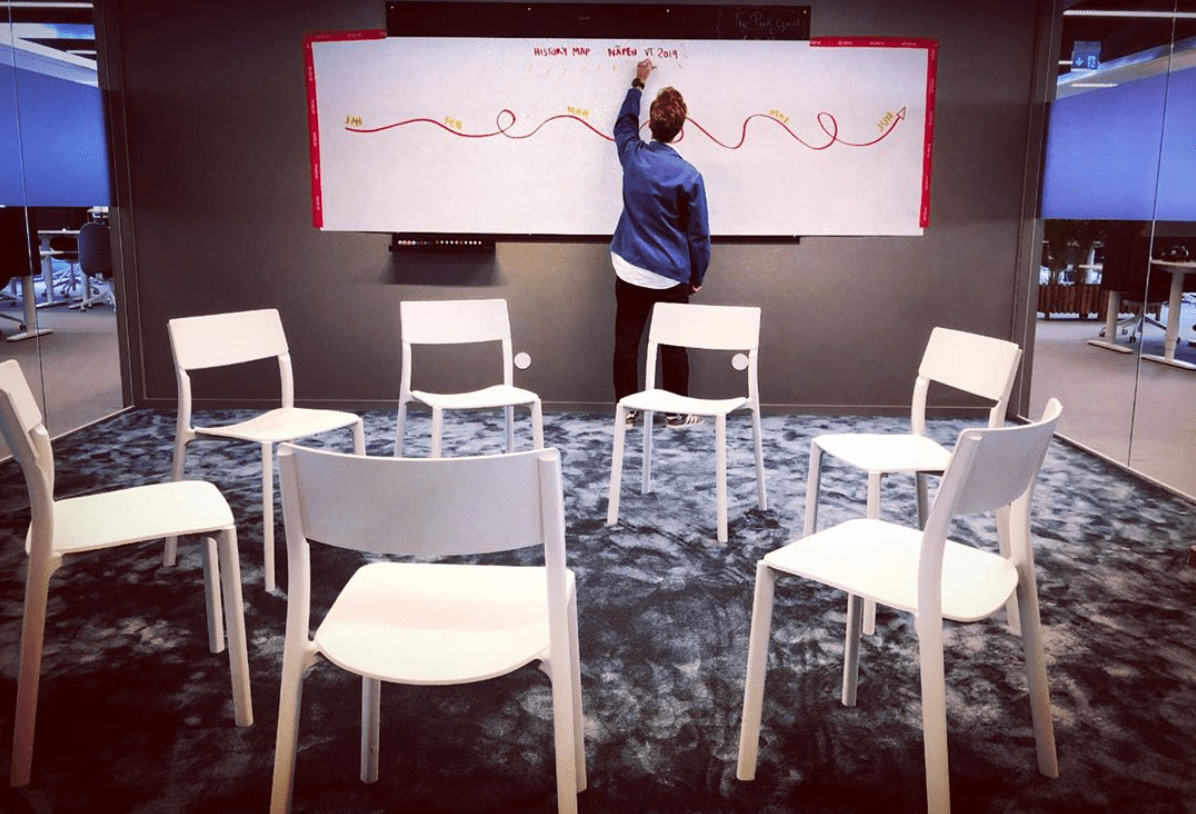
“Take all those hierarchies away and make sure that every member of the team feels equally important”
Interview with Johanna Olsson, Learning designer and co-founder, The Hows
Johanna Olsson is an inspiring Swedish woman working on facilitation and learning design for teams. In this interview she tells us about her studies in theatre, work in the film industry, and how her frustrations in working with people of different backgrounds led her to dive into the fascinating world of team building. We also had time to discuss the lack of team building in academic research teams and job opportunities for researchers like us in the field. It’s all in the text and podcast! Enjoy!
[soundcloud url=”https://api.soundcloud.com/tracks/638972883″ params=”color=#ff5500&auto_play=false&hide_related=false&show_comments=true&show_user=true&show_reposts=false&show_teaser=true&visual=true” width=”100%” height=”300″ iframe=”true” /]
I dare to say that everyone enjoys meeting people who are enthusiastic and show in all angles to love what they do with an open smile. This is how I felt when I met Johanna Olsson, one of the facilitators of an online leadership course I attended in the spring of 2018. Fascinated by topics such as leadership and team dynamics, I signed up for this course aiming to understand even more how good teams function in a working context.
All the course contents were very inspiring and made us reflect every week on our team and leader in different angles and even try to run small workshops with our team to discuss relevant aspects of the way we work together. With this course I confirmed, in first place, how important personal relationships are within a team in order to ensure effective teamwork and success: for example, the importance of knowing and understanding each other; the importance of working towards a clear goal and sense of direction; the importance of feeling valued and cared by our leader. Sounds simple, right? But I wonder how many academic labs have these aspects considered or discussed by their group leaders. Secondly, I could identify many of the good qualities discussed in the course in the way my current boss leads us (you can read more on our lab and leader in two of my previous posts on my academic career so far and on our lab retreat in Spain). In fact, he was very pleased when I volunteered to run a team-reflection activity for our lab retreat so that we could improve the way we work together.
Almost one year later, I still feel that course was mind opening and inspiring. I happened to see in LinkedIn that Johanna Olsson had recently created her own company – The Hows – focused on exactly the topic of helping teams working better together. How exciting was this!? It was clear to me that I had to contact her to learn more about this new adventure in her career and understand better how it is like to work everyday building better teams.

Source: @the.hows Instagram account
The initial passion for cinema and story telling
Johanna welcomed me with her characteristic warm smile in the co-working space in Södermalm where The Hows is based and told me about her career path in a very relaxed conversation. Interestingly, Johanna started by studying cinema after having done a lot of theatre when she was younger and later having developed a big love for story telling.
“I realized half-way through that acting was not my thing but directing and writing was really interesting”, she says.
As she started working in her own cinema production company, she often felt frustrated with the way things seemed not to work. Working with actors and cameras and sound engineers, she always felt they should be able to do things better and some frustrations were the trigger to look for something different.
“It was either the way we communicated, the way we handled conflicts, the way we should talk about the vision that we had, we never really met all the way. Things simply felt like they didn’t work and we should do them better!”
Johanna kept going back to work in theatre as she considers theatre the extreme sport of team-building.
“In theatre, I am very vulnerable when facing a big audience, and have to rely 100 percent on my team. In case I forget a line, for example, they have to support me. It is the ultimate exercise of trust.”
She could not find this trust in the production company and could not understand why. Moreover, she also kept identifying aspects that could be improved in small companies with whom they worked with on some commercials. All of this slowly led her to dive into the world of facilitation and learning design to try to understand how teams can become better.
Time to change path and do additional training
Johanna took the 3-year Chaos Pilots Course in Denmark on creative leadership including facilitation training and understanding how to support an organisation to be better inside but also to the outside.
“This is a very alternative and challenging program that questions you to the core. Who are you in this world? Who are you in a team or as a leader? What do you want to change? It was three years of being through some sort of tornado”, she explains.
Johanna highly recommends this program. Besides having learned something new, she challenged herself to navigate in a different context and had to understand how to use new skills and competences to go through the course. Johanna also took part of a short leadership course from the Swedish Defense University. She highlights that people might consider these topics quite alternative, soft or hippie but, at the end, leadership is all about human nature and communication so it is clear they are essential in any area, even in the military, so she also learned a lot from their methodology.
Working in team facilitation and learning design
She worked on different real projects during the Chaos-Pilots training, and then was offered a job in a project called Boost, supporting story-telling teams from different areas (TV, mobile, theatre, filmmaking, gaming) to work better together. There was a lot of space and freedom to do what she wanted and she had a great time. Being a very dynamic woman, Johanna kept multiple jobs in parallel, including her own company. This gave her enormous experience in the facilitation field and a feeling of great achievement. However, the time came when she felt she should try to focus all her efforts and energy only in one thing to try to learn more. Johanna joined Hyper Island, a Swedish high-education institution in areas of design and digital business where the development of soft skills (or fundamental skills, as Johanna calls them) also has great importance.
“Half of all the programs are focused on the skills you actually need to work in the changing industry that we’re in. So, it’s about communication, leadership, who are you in a team, how can you work well together.” she justifies.
They also provide consultancy services to companies on team facilitation, which allowed her to keep working on different projects. After initially having planned to work there for one year and then continuing to a new project, she ended up staying eightyears.
“I totally fell in love with Hyper Island and the way of working there. We learn all the time and when I felt I was done with something, I was given a new challenge or project that I could not refuse.”
I asked Johanna to explain how Hyper Island works and the courses they offer (all in the podcast!) and as she is talking, she realises she still talks about Hyper Island as we and not they.
“They always say that we can check-out but never leave Hyper Island and I am starting to think that is true!”
And she adds that about a year before she left, she knew that the main reason to still be there was the well-functioning team she was part of.
Time to start her company!
It took her only two days after having accepted a job offer to join another company to realize that she was not ready to leave her previous team where there was a lot of love and some of her closest friends. After many years joking with each other about starting their company together, that was the right time to finally do it.

Source: @the.hows Instagram account
And The Hows was born. She explains that the extensive network of collaborators and friends, including Hyper Island, have helped them to start not only with excitement but also with some sense of safety. They found the nice office space where they are based today and already have a good network of customers. Johanna adds that their team has undergone many challenges due to all the changes, new context, and new vision to be defined, even if they are the same people who have worked together for so long. They strive to prioritise communication and team development to ensure they work well together and represent something special that their clients can value. “Now we are three months in and it seems everything is working too perfectly to be true! We have our clients, we have a lot of new exciting collaborations, new big projects coming in, that we also prioritize in a way that we can learn from them. We also spend a lot of time making sure we can get better and we learn from each other so we don’t run the risk of becoming just another consultancy agency. And we keep collaborating with other companies and colleagues, this is essential” she adds.
At The Hows they also plan to develop online contents and courses that can accompany the remote world where we live in.
“A lot of companies have people working in different parts of the world, so we want to use all the wonderful new tools that exist to help creating better teams also in these contexts. And I believe online training courses can be just as effective.”

Source: @the.hows Instagram account
Final reflections on team work & academic research
My current group is divided between Stockholm and Helsinki. We keep discussing better ways to communicate effectively and it has always been challenging, even with all the different online tools we have. Johanna agrees that meeting our colleagues face to face is important and that time should be used to the maximum but team building work needs to continue after that and it is all about the mindset and keep prioritizing that remotely too.
“It is important to take all those hierarchies away and make sure that every member of the team feels equally important”. This is exactly what my boss tries to do which makes big impact on our team. But we do need individual commitment to communicate to the others and I am sure this is a constant challenge both for teams that work remotely as in only one place.
I think many academic groups would benefit from this kind of work on team development since I have the impression most group leaders prioritise results in detriment of team building and finding the right people to work together. They don’t even think that is necessary. Johanna agreed with me that the big academic institutions should prioritize this kind of training and encourage it to the different group leaders.
“If you want the good results, then you need to take this time to build your team because there is no time to waste and this is how we will achieve the best results. “ And she cites Martin Luther King: “Today I have so much to do that I need to spend an extra hour on my knees praying. And this means that it is exactly when we have more to do that we need to stop and really decide on what to focus our efforts on. Gather our troops!”
We finally discussed whether people with an academic background who develop so many soft skills throughout their career could have an opportunity to work in this field of team building. Johanna considers that our scientific background and some additional training via short courses or internships, for example, would make us excellent candidates. And she advises:
“You can read a lot about people and how they behave but the most important is that you start doing. Take all the possibilities in your workplace and start trying and trying and trying and it will grow from itself!” According to Johanna, nowadays, there are even companies who are willing to hire a dedicated person to train their teams rather than hiring a consultant, so it would never be a better time to start working in this area.
As take home messages from this interview, I keep in mind the passion for her work, the importance of a good network and working with the right people to find true satisfaction at work. And I will not lose hope of trying to get more research groups discussing teamwork in order to work well together. It can start from YOU suggesting a small activity in your group!
If you feel as inspired as me from this piece and would like to hear my conversation with Johanna, check the podcast attached at the beginning of the post.
I would love to bring you more interviews with interesting people from different areas so please leave your comments below if you have any suggestions!

0 comments